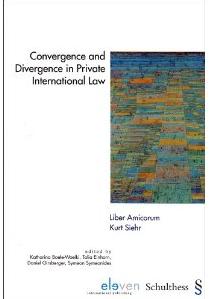Anuario Español de Derecho Internacional Privado 2009
A new number of the AEDIPr has been released. These are the doctrinal studies included in the volume:
ESTUDIOS
Nerina Boschiero, “Las reglas de competencia judicial de la unión europea en el espacio jurídico internacional”
Haimo Schack, “La (indebida) abolición de los procedimientos de exequátur en la unión europea”
Alegría Borrás, “La celebracion de convenios internacionales de derecho internacional privado entre estados miembros de la union europea y terceros estados”
Angel Espiniella Menéndez, “Dimensión externa del derecho procesal europeo”
Manuel Desantes y José Luis Iglesias Buhigues, “Hacia un sistema de derecho internacional privado de la unión europea”
Paul Beaumont y Burcu Yürsel, “La reforma del reglamento de Bruselas I sobre acuerdos de sumisión y la preparación para la ratificación por la UE del Convenio de la Haya sobre acuerdos de elección de foro”
Paul L.C. Torremans, “El EPLA y la patente comunitaria o el acuerdo sobre el tribunal europeo y de la UE y la patente de la UE: ¿una oportunidad para deshacerse de Gat / Luk y de la competencia exclusiva?”
Sylvaine Poillot Peruzzett, “La incidencia de las modalidades del reconocimiento de decisiones en el espacio judicial europeo en la dualidad orden público nacional / orden público europeo”
Crístian Oró Martínez, “Control del orden público y supresión del exequátur en el espacio de libertad, seguridad y justicia: perspectivas de futuro”
Pilar Jiménez Blanco, “Acciones de resarcimiento por incumplimiento de los acuerdos de elección de foro”
Gilles Cuniberti y Marta Requejo Isidro, “Cláusulas de elección de foro: fórmulas de protección”
Patricia Orejudo Prieto de los Mozos, “La incompatibilidad de decisiones como motivo de denegación de la ejecución de los títulos ejecutivos europeos”
Beatriz Añoveros Terradas, “Extensión de los foros de protección del consumidor a demandados domiciliados en terceros estados”
Julio Antonio García López, “Repercusiones de la sentencia del tribunal de justicia europeo en el asunto Sundelind López: ámbito de aplicación espacial de las normas de competencia judicial internacional de la unión europea en materia de separación y divorcio”
Benedetta Ubertazzi, “Licencias de derechos de propiedad intelectual y reglamento comunitario sobre la competencia judicial”
José Ignacio Paredes Pérez, “Licencias de derechos de propiedad y las acciones colectivas en el reglamento “Bruselas I”: una aproximación desde la perspectiva de los intereses de los consumidores”
Vésela Andreeva Andreeva, “Licencias de derechos de propiedad y protección de los consumidores en el reglamento Bruselas I y su articulación con el reglamento Roma I”
Mònica Vinaixa Miquel, “La aplicación extracomunitaria de los foros especiales del art. 5 del Reglamento Bruselas I”
Clara I. Cordero Alvarez, “Algunos problemas de aplicación del art. 5.3º del reglamento 44/2001”
María López de Tejada Ruiz, “La incompatibilidad de decisiones en los nuevos reglamentos comunitarios”
María Jesús Elvira Benayas, “Una visión transversal del reglamento 1206/2001 sobre obtención de pruebas en materia civil y mercantil”
Marta Casado Abarquero, “La investigación del patrimonio del deudor ejecutado en el extranjero”
Alberto Muñoz Fernández, “La obtención de pruebas en EEUU para su empleo en procesos españoles”
Nicolás Zambrana Tévar, “La práctica del discovery entre los EEUU de América y España. especial atención al caso Prestige”
Toshiyuki Kono, “La reforma de la ley relativa al procedimiento civil en Japón “
Aurelio López–Tarruella Martínez, “La regulación en Japón de la competencia judicial internacional en materia de propiedad industrial e intelectual: una visión desde Europa”
Gilberto Boutin “La concurrencia de foros en el derecho procesal internacional panameño y en la Convención de Bustamante: forum non conviniens y litispendencia internacional”
Amalia Uriondo de Martinoli, “Reclamaciones litigiosas de alimentos entre convivientes desde una perspectiva latinoamericana”
Click here to consult whole summary



 In the case of the two men who had contracted with a woman living in California in a case of international surrogate motherhood, a Court of Appeal has recently issued its ruling, reversing in part
In the case of the two men who had contracted with a woman living in California in a case of international surrogate motherhood, a Court of Appeal has recently issued its ruling, reversing in part  The Court proceeded first to review the situation of the parent who was the biological father of the twin girls. It found that under Belgian law, since the surrogate mother was not married, the father could have recognized the children and hence legally become their father. The situation was different for the other man who had ‘commissioned’ the children, as he was not biologically linked with the children. The Court found that under Belgian law, there was no possibility to establish a legal parentage between a child and two persons of the same sex, outside the specific situation of adoption by same sex couples.
The Court proceeded first to review the situation of the parent who was the biological father of the twin girls. It found that under Belgian law, since the surrogate mother was not married, the father could have recognized the children and hence legally become their father. The situation was different for the other man who had ‘commissioned’ the children, as he was not biologically linked with the children. The Court found that under Belgian law, there was no possibility to establish a legal parentage between a child and two persons of the same sex, outside the specific situation of adoption by same sex couples.